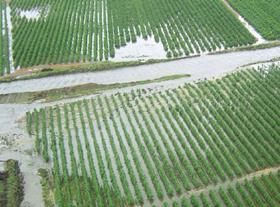




At a recent meeting the group debated questions relating to a very topical subject - extreme weather events, such as the winter flooding - and their impact on livelihoods, the economy and food security.
The focus has been almost entirely devoted to the here-and-now aspects of flooding, and coverage of the Somerset Levels and other badly affected areas has travelled around the globe. The knock-on effects and the serious consequences have so far received scant attention.
The fact that flooding here coincided with different types of extreme weather events in other parts of the world has been virtually ignored, save to re-open the argument relating to the cause of climate change. Governments are stretched to deliver solutions to current problems and those of the future are relegated to the bottom of the ladder.
Members of the focus group were concerned about the failure to see the bigger picture.

Professor Chris Atkinson, Greenwich University
'Food production in the UK is a highly scheduled process which challenges both producers and retailers, particularly when UK weather becomes erratic. The record-breaking rains we have had over the winter will add to this challenge as we will see a disruption to the timing of our normal supply of plenty. Crop planting and normal spring management will have been delayed until it’s suitable and safe to start working the land again. Very wet and cold soils will also be slow to warm, thus crop growth will initially be slow. We may however, if we are smart, learn from this somewhat abnormal winter the importance of looking after our food production system and helping farmers more.'

Jamie Weir, CPRE Protect Kent
'While the flooding has been dramatic throughout Kent and other parts of the country, CPRE Protect Kent is hopeful this will ensure the issue is taken more seriously in the future. We are particularly concerned with the lack of drainage maintenance on Romney Marshes. Our fear is because of failure to maintain the ditches and waterways, Romney Marsh could turn into Kent’s very own version of the Somerset Levels. CPRE Protect Kent, alongside the local NFU and many local farmers and residents, is calling for action now before it is too late.'

Dr Ursula Twomey, East Malling Research
'High levels of waterlogging will impact on a range of factors that affect crop productivity. One such factor could be an increase in levels of disease. For example, canker can be expressed in trees already stressed by waterlogging. Phytophthora species, soil-borne fungi, are more active in spring and early summer so that if the wet conditions persist, the risk of damage from these organisms will increase, potentially leading to root and crown rot in Prunus species and apples. Incidences of honey fungusinfection could also increase.'

Dr Alan Rae FCIM AMRS
'It’s clear from the recent events that the UK infrastructure is not designed to cope with the monsoon that we’ve experienced recently. The question is what can practically be done about it. One of the problems is that left to its own devices nature will do certain things that mitigate the flow of water. For one thing it allows rivers to meander in flood plains and create wet lands able to hold more water. For another it allows the heads of catchment areas to become boggy and to become covered in bushes and trees. This buffers water in two ways: the roots allow the water to get further down into the soil and at times of year when there are leaves, they remove water by transpiration.
'Two more points that apply directly to agriculture: increasing the organic matter in the soil greatly improves the ability of the ground to buffer water by holding it when it's wet and retaining it in dry conditions. We also need to be aware that allowing the surface of the ground to be bare in winter results in the soil washing away. We have seen it here in Sussex and there is a really scary photo of the UK showing the degree to which soil had run off into the sea – joining the approximately one-third of USA soil now at the bottom of the ocean. When we consider that we lose 1-40 tonnes of top soil a year per hectare - and only form 0.2 tonnes - it puts the whole idea of sustainability into context.'
Tessa O’Sullivan, Action with Communities in Rural Kent
'Housing Associations must build to level 3 of The Code for Sustainable Homes, part of which states that the run-off from a development site must not exceed that of its previous use. They must demonstrate, via engineering calculations, that the surface water run off can be held in storage tanks, bore holes or ‘crates’ and released at the same rate as rainwater running off a field. In some instances permeable road surfaces might also need to be used. There is a recent example where local people provided photographic evidence of historic flooding near a potential site; this did not prevent the development but meant that larger storage tanks were used to cater for that ‘1-in-a-100-year storm’.'
The Rural Focus Press Group, formed and chaired by Pat Crawford - press officer for Hadlow College - consists of members representing a number of rural bodies and associations including the CPRE (Protect Kent), the NFU, East Malling Research, the Women’s Farming Union, Kent Wildlife Trust, Greenwich University, AG Advisory, LEAF, Women’s Farming Union, Kent County Agricultural Society, the English Apple Man, Country Landowners’ Association, and Hadlow College.






No comments yet